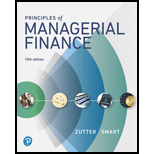
Gitman: Principl Manageri Finance_15 (15th Edition) (What's New in Finance)
15th Edition
ISBN: 9780134476315
Author: Chad J. Zutter, Scott B. Smart
Publisher: PEARSON
expand_more
expand_more
format_list_bulleted
Question
Chapter 1, Problem 1.12P
Summary Introduction
To discuss: The managers of the firm have to maximize the shareholder wealth which is a subject to ethical constraints and regarding the ethical considerations.
Introduction:
A particular problem where an organization has to select between alternatives that must be evaluated as right or unethical is termed as ethical problem.
Expert Solution & Answer
Want to see the full answer?
Check out a sample textbook solution
Students have asked these similar questions
What is the value at the end of year 3 of a perpetual stream of $70,000 semi-annual
payments that begins at the end of year 7? The APR is 12% compounded
quarterly.
Firm A must pay $258,000 to firm B in 10 years. The discount rate is 16.44 percent per year. What is the present value of the cash flow associated with this arrangement for firm A?
-I got the answer of 56331.87773=56332 (rounded to the nearest dollar), but it says incorrect.
Suppose you have two histograms: one where the mean equals the median, and one where the mean is different from the median. How would you expect the two histograms to differ.
Chapter 1 Solutions
Gitman: Principl Manageri Finance_15 (15th Edition) (What's New in Finance)
Ch. 1.1 - What is the goal of the firm and, therefore, of...Ch. 1.1 - For what three main reasons is profit maximization...Ch. 1.1 - What is risk? Why must financial managers consider...Ch. 1.1 - Is maximizing shareholder wealth inconsistent with...Ch. 1.2 - What are the main types of decisions that...Ch. 1.2 - Prob. 1.6RQCh. 1.2 - Prob. 1.7RQCh. 1.2 - What are the major differences between accounting...Ch. 1.2 - Prob. 1.9RQCh. 1.3 - Prob. 1.10RQ
Ch. 1.3 - Prob. 1.11RQCh. 1.3 - What does it mean to say that corporations face a...Ch. 1.3 - Prob. 1.13RQCh. 1.3 - Prob. 1.14RQCh. 1.3 - Prob. 1.15RQCh. 1 - Learning Goal 4 ST1-1 Emphasis on Cash Flows...Ch. 1 - Prob. 1.1WUECh. 1 - Prob. 1.2WUECh. 1 - Learning Goal 4 E1-3 The end-of-year parties at...Ch. 1 - You have been made treasurer for a day at AIMCO,...Ch. 1 - Recently, some branches of Donut Shop, Inc., have...Ch. 1 - Ross Company, a manufacturer of pharmaceuticals,...Ch. 1 - Prob. 1.1PCh. 1 - Prob. 1.2PCh. 1 - Cash flows It is typical for Jane to plan,...Ch. 1 - Marginal cost-benefit analysis and the goal of the...Ch. 1 - Identifying agency problems, costs, and...Ch. 1 - Corporate taxes Tantor Supply, Inc., is a small...Ch. 1 - Prob. 1.7PCh. 1 - Prob. 1.8PCh. 1 - Prob. 1.9PCh. 1 - Interest versus dividend expense Michaels...Ch. 1 - Hemingway Corporation is considering expanding its...Ch. 1 - Prob. 1.12PCh. 1 - Prob. 1SE
Knowledge Booster
Similar questions
- (a) The variables have been stripped of their names. Which one do you think is "household income" ?(b) Calculate the mean, median, and standard deviation of household income. Do these numbers fit with your expectations? (c) Suppose you have two histograms: one where the mean equals the median, and one where the mean is different from the median. How would you expect the two histograms to differ?arrow_forwardJanet Foster bought a computer and printer at Computerland. The printer had a $860 list price with a $100 trade discount and 210210 , n30n30 terms. The computer had a $4,020 list price with a 25% trade discount but no cash discount. On the computer, Computerland offered Janet the choice of (1) paying $150 per month for 17 months with the 18th payment paying the remainder of the balance or (2) paying 6% interest for 18 months in equal payments. Assume Janet could borrow the money for the printer at 6% to take advantage of the cash discount. How much would Janet save? Note: Use 360 days a year. Round your answer to the nearest cent.arrow_forwardDon't used Ai solutionarrow_forward
- Consider the following cash flows on two mutually exclusive projects for the Bahamas Recreation Corporation (BRC). Both projects require an annual return of 14 percent. New Submarine Deepwater Fishing Year Ride 0 -$875,000 1 330,000 2 480,000 3 440,000 -$1,650,000 890,000 730,000 590,000 a-1. Compute the IRR for both projects. (Do not round intermediate calculations and enter your answers as a percent rounded to 2 decimal places, e.g., 32.16.) Deepwater Fishing Submarine Ride 19.16 % 17.50% a-2. Based on the IRR, which project should you choose? Deepwater Fishing Submarine Ride b-1. Calculate the incremental IRR for the cash flows. (Do not round intermediate calculations and enter your answer as a percent rounded to 2 decimal places, e.g., 32.16.) Incremental IRR 14.96 % b-2. Based on the incremental IRR, which project should you choose? Submarine Ride Deepwater Fishingarrow_forwardWhat is the possibility that cases are not readily bounded but may have blurry definitions? How to address Robert Yin statement and how to resolve the ‘not readily bound’ case? Please help explain.arrow_forwardAn investment that is worth $44,600 is expected to pay you $212,205 in X years and has an expected return of 18.05 percent per year. What is X?arrow_forward
- An investment that is worth $27,200 is expected to pay you $62,280 in 5 years and has an expected return of X percent per year. What is X?arrow_forwardDon't used Ai solution and don't used hand raitingarrow_forward3-7. (Working with an income statement and balance sheet) Prepare a balance sheet and income statement for Kronlokken Company from the following scrambled list of items. a. Prepare a common-sized income statement and a common-sized balance sheet. Interpret your findings. Depreciation expense $66,000 Cash 225,000 Long-term debt 334,000 Sales 573,000 Accounts payable 102,000 General and administrative expense 79,000 Buildings and equipment 895,000 Notes payable 75,000 Accounts receivable 153,000 Interest expense 4,750 Accrued expenses 7,900 Common stock 289,000 Cost of goods sold 297,000 Inventory 99,300 Taxes 50,500 Accumulated depreciation 263,000 Prepaid expenses 14,500 Taxes payable 53,000 Retained earnings 262,900 ||arrow_forward
- x3-3. (Preparing an income statement) Prepare an income statement and a common- sized income statement from the following information. MyLab Sales Cost of goods sold General and administrative expenses Depreciation expenses Interest expense Income taxes $525,000 200,000 62,000 8,000 12,000 97,200arrow_forward3-9. (Working with a statement of cash flows) Given the following information, prepare LO3 a statement of cash flows. Increase in accounts receivable Increase in inventories Operating income Interest expense Increase in accounts payable Dividends $25 30 75 25 25 15 20 Increase in net fixed assets 23 Depreciation expense Income taxes 12 17 Beginning cash 20 Increase in common stockarrow_forward3-4. (Preparing a balance sheet) Prepare a balance sheet from the following informa- LO2 tion. What is the net working capital and debt ratio? Cash $50,000 Account receivables 42,700 Accounts payable 23,000 Short-term notes payable 10,500 Inventories 40,000 Gross fixed assets 1,280,000 Other current assets 5,000 Long-term debt 200,000 Common stock 490,000 Other assets 15,000 Accumulated depreciation 312,000 Retained earnings ? MyLabarrow_forward
arrow_back_ios
SEE MORE QUESTIONS
arrow_forward_ios
Recommended textbooks for you

 EBK CONTEMPORARY FINANCIAL MANAGEMENTFinanceISBN:9781337514835Author:MOYERPublisher:CENGAGE LEARNING - CONSIGNMENT
EBK CONTEMPORARY FINANCIAL MANAGEMENTFinanceISBN:9781337514835Author:MOYERPublisher:CENGAGE LEARNING - CONSIGNMENT
- Business/Professional Ethics Directors/Executives...AccountingISBN:9781337485913Author:BROOKSPublisher:Cengage
 Intermediate Financial Management (MindTap Course...FinanceISBN:9781337395083Author:Eugene F. Brigham, Phillip R. DavesPublisher:Cengage Learning
Intermediate Financial Management (MindTap Course...FinanceISBN:9781337395083Author:Eugene F. Brigham, Phillip R. DavesPublisher:Cengage Learning


EBK CONTEMPORARY FINANCIAL MANAGEMENT
Finance
ISBN:9781337514835
Author:MOYER
Publisher:CENGAGE LEARNING - CONSIGNMENT



Business/Professional Ethics Directors/Executives...
Accounting
ISBN:9781337485913
Author:BROOKS
Publisher:Cengage

Intermediate Financial Management (MindTap Course...
Finance
ISBN:9781337395083
Author:Eugene F. Brigham, Phillip R. Daves
Publisher:Cengage Learning